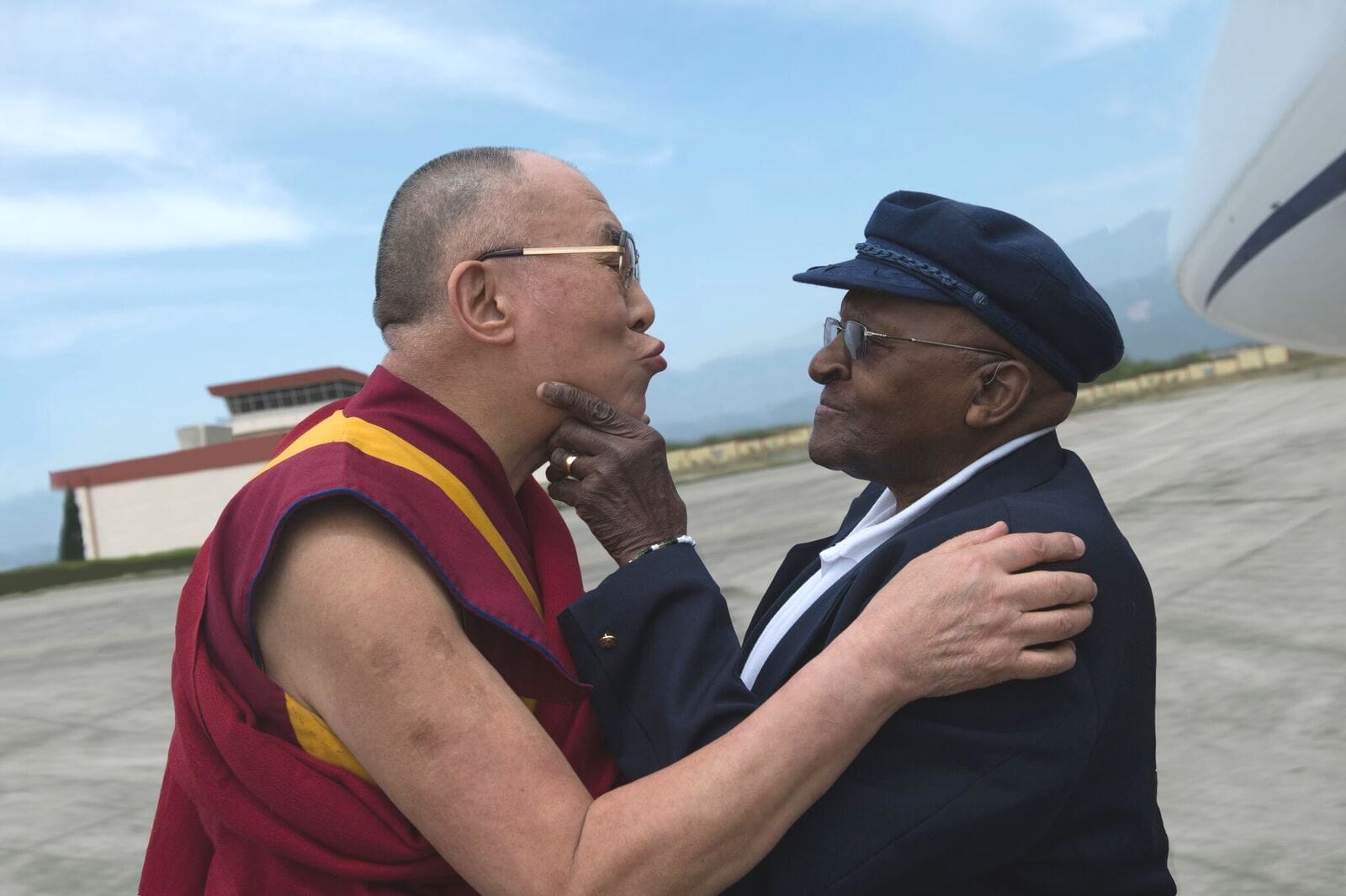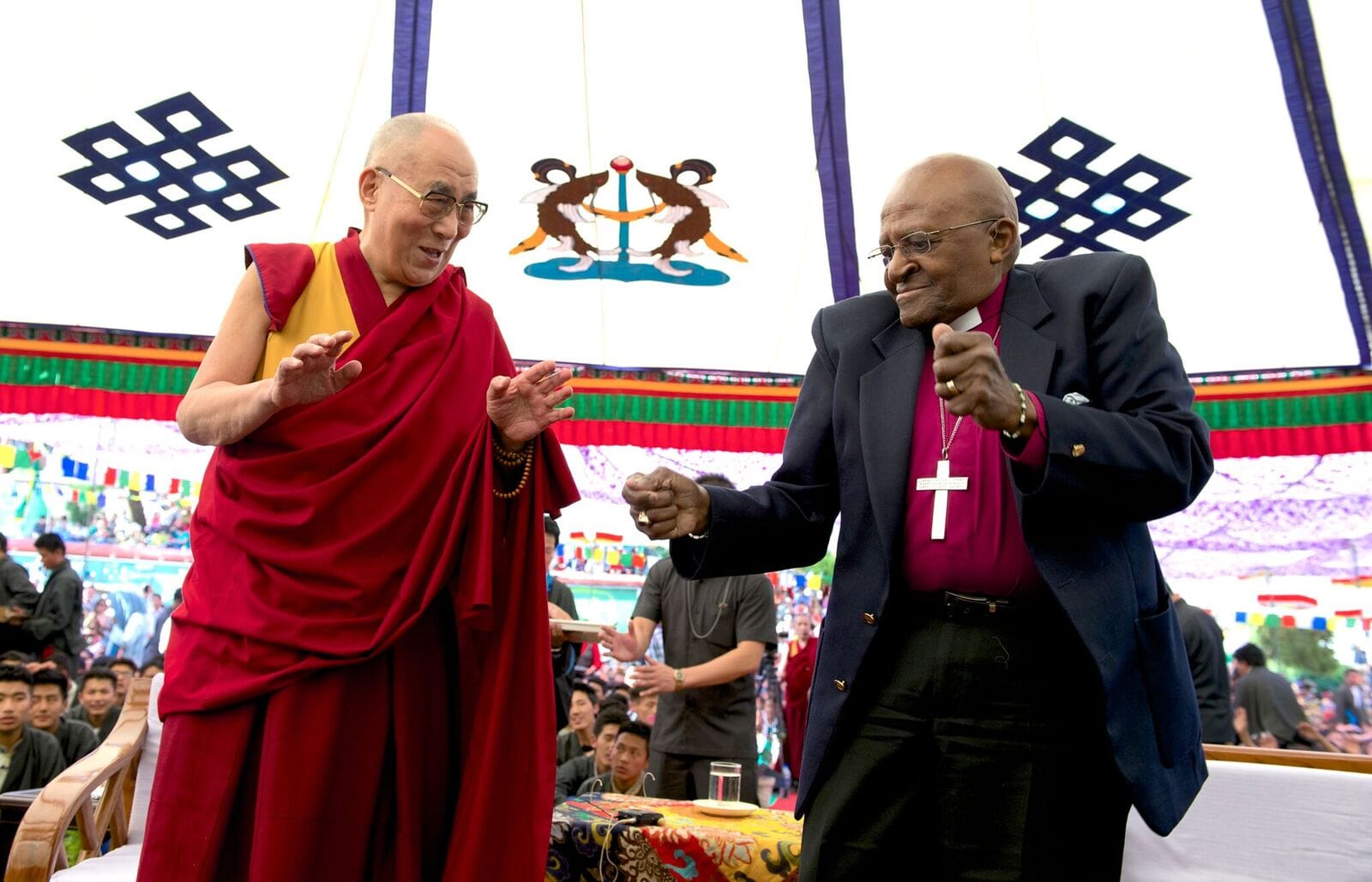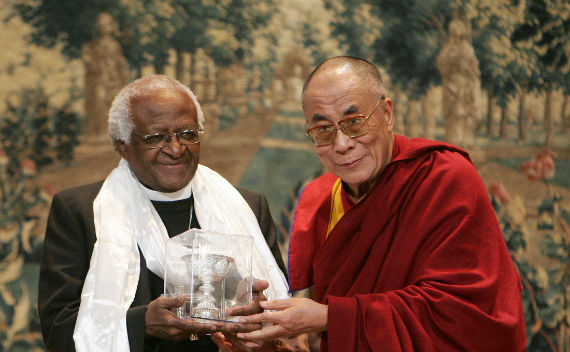- Anti-apartheid hero won Nobel Peace Prize in 1984
- Lauded by both Black and white South Africans
- Tributes pour in from across the globe
- Diagnosed with cancer in 1990s
![Congratulating Archbishop Desmond Tutu on… | The 14th Dalai Lama]()
JOHANNESBURG, Dec 26 (Reuters) - Archbishop Desmond Tutu, a Nobel Peace Prize laureate and veteran of South Africa's struggle against apartheid who was revered as his nation's conscience by both Black and white, died on Sunday aged 90.
![The Dalai Lama and Desmond Tutu - The Best of Spiritual Friends - Lion's Roar]()
Tutu won the Nobel prize in 1984 in recognition of his non-violent opposition to white minority rule. A decade later, he witnessed the end of that regime and chaired a Truth and Reconciliation Commission, set up to unearth atrocities committed under it.
Ever outspoken, he preached against the tyranny of the white minority.
![Amazon.com: The Book of Joy: Lasting Happiness in a Changing World: 9780399185045: Lama, Dalai, Tutu, Desmond, Abrams, Douglas Carlton: Books]()
After apartheid ended, he called the Black political elite to account with as much feistiness as he had the Afrikaners, but his enduring spirit of reconciliation in a divided nation always shone through, and tributes to him poured in from around the world on Sunday.
South African President Cyril Ramaphosa described Tutu in a televised address as "one of our nation's finest patriots" adding, "our nation's loss is indeed a global bereavement."
U.S. President Joe Biden said Tutu followed his spiritual calling to create a better, freer, and more equal world. "His legacy transcends borders and will echo throughout the ages."
"Archbishop Desmond Tutu was a mentor, a friend and a moral compass for me and so many others," former President Barack Obama said. "He never lost his impish sense of humour and willingness to find humanity in his adversaries."
Bill Clinton called Tutu's life "a gift."
![Dalai Lama, Desmond Tutu team up for happiness book - The Economic Times]()
TWO NOBELS ON ONE STREET
Born near Johannesburg, Tutu spent most of his later life in Cape Town and led numerous marches and campaigns to end apartheid from St George's Cathedral's front steps.
Tutu died "peacefully" on Sunday morning in a Cape Town nursing home, a representative of his Archbishop Desmond Tutu IP Trust said. He will lie in state at St George's on Friday before his funeral service there on Saturday, it said.
Looking frail and in a wheelchair, he was last seen in public in October at St George's Cathedral in Cape Town - a one-time safe haven for anti-apartheid activists - for a service marking his 90th birthday.
He was diagnosed with prostate cancer in the late 1990s and was later hospitalised several times to treat infections associated with treatment for it.
In his final years he also regretted that his dream of a "Rainbow Nation" had yet to come true, and often fell out with erstwhile allies at the ruling African National Congress party over their failures to address the poverty and inequalities that they promised to eradicate.
Just five feet five inches (1.68 metres) tall and with an infectious giggle, Tutu travelled tirelessly through the 1980s to become the face of the anti-apartheid movement abroad while many of the leaders of the then rebel ANC, including future President Nelson Mandela, were behind bars.
Long-time friends, Tutu and Mandela lived for a time on the same street in the South African township of Soweto, making Vilakazi Street the only one in the world to have been home to two Nobel Peace Prize winners.
"His most characteristic quality is his readiness to take unpopular positions without fear," Mandela once said of Tutu. "Such independence of mind is vital to a thriving democracy."
![The Dalai Lama and Desmond Tutu - The Best of Spiritual Friends - Lion's Roar]()
'A PROPHET AND A PRIEST'
Having officially retired from public life on his 79th birthday Tutu - who once said of himself: "I wish I could shut up, but I can't, and I won't" - continued to speak out on a range of moral issues.
John Steenhuisen, leader of opposition party The Democratic Alliance, said Tutu's spirit would live on "in our continued effort to build a united, successful, non-racial South Africa for all."
In 2008, Tutu accused the West of complicity in Palestinian suffering by remaining silent.
In 2013, he declared his support for gay rights, saying he would never "worship a God who is homophobic."
Archbishop of Canterbury Justin Welby on Sunday hailed Tutu as "a prophet and priest" while Pope Francis offered heartfelt condolences to his family and loved ones.
In a letter to Tutu's daughter Reverend Mpho Tutu, Tibet's spiritual leader, the Dalai Lama, said the world had "lost a great man, who lived a truly meaningful life."
"We are better because he was here," said Martin Luther King's daughter Bernice.
Additional reporting by Wendell Roelf and Olivia Kumwenda-Mtambo; Writing by James Macharia Chege; Editing by Kirsten Donovan, John Stonestreet and Richard Chang
![Tributes paid to anti-apartheid icon Desmond Tutu | News | DW | 26.12.2021]()
‘Moral giant’: How the world reacted to Desmond Tutu’s death
https://www.aljazeera.com/news/2021/12/26/world-mourns-death-of-desmond-tutu-south-africas-moral
26 Dec 2021
|
Updated:
26 Dec 2021
09:30 PM (GMT)
The archbishop’s legacy as an ‘anti-apartheid hero’ is remembered in South Africa and around the world.
The death of South Africa’s Archbishop Desmond Tutu, a veteran of the struggle against apartheid and Nobel Peace Prize winner, has seen condolences pour in from leaders around the world.
Tutu died on Sunday aged 90.
![The Dalai Lama and retired Archbishop Desmond Tutu have written a book titled “The Book of Joy” — Quartz Africa]()
South Africa President Cyril Ramaphosa on Sunday announced the death of 90-year-old Tutu, saying his loss was “another chapter of bereavement in our nation’s farewell to a generation of outstanding South Africans who have bequeathed us a liberated South Africa.”
This is how the world reacted to the news of his death:
South Africa
“Desmond Tutu was a patriot without equal; a leader of principle and pragmatism who gave meaning to the biblical insight that faith without works is dead,” Ramaphosa said.
John Steenhuisen, leader of the South African opposition party Democratic Alliance, said “a true South African giant has left us today, but his spirit will live on in the everyday kindness we South Africans show each other, and in our continued effort to build a united, successful, non-racial South Africa for all … When we lost our way, he was the moral compass that brought us back.”
Kenya
Kenyan President Uhuru Kenyatta said Tutu’s passing was “a big blow not only to the Republic of South Africa, where he leaves behind huge footprints as an anti-apartheid hero, but to the entire African continent where he is deeply respected and celebrated as a peacemaker”.
“Archbishop Tutu inspired a generation of African leaders who embraced his non-violent approaches in the liberation struggle,” he said.
Nelson Mandela Foundation
The Nelson Mandela Foundation, dedicated to the South African anti-apartheid political leader and an ally of Tutu, praised the archbishop’s legacy.
“His contributions to struggles against injustice, locally and globally, are matched only by the depth of his thinking about the making of liberatory futures for human societies. He was an extraordinary human being. A thinker. A leader. A shepherd,” it said.
Amnesty International
Amnesty International South Africa Executive Director Shenilla Mohamed in a statement said Tutu’s commitment to rights and equality for everyone |served as a much needed moral compass during the turbulent apartheid era”.
“Even after South Africa obtained freedom in 1994, the Archbishop continued to be an outspoken, passionate human rights activist,” she added.
“He was never afraid to call out human rights violators no matter who they were and his legacy must be honoured by continuing his work to ensure equality for all.”
Bernice King
The daughter of Martin Luther King, the American Baptist minister and activist who campaigned for the rights of the Black community, also shared her sorrow.
![China, South Africa, and the Dalai Lama | Council on Foreign Relations]()
“I’m saddened to learn of the death of global sage, human rights leader, and powerful pilgrim on earth … we are better because he was here,” Bernice King said.
United States
US President Joe Biden and First Lady Jill Biden said they were “heartbroken” to learn of Tutu’s death, calling him a “true servant of God and of the people”.
“His courage and moral clarity helped inspire our commitment to change American policy toward the repressive Apartheid regime in South Africa,” they said.
Dalai Lama
Tibetan spiritual leader the Dalai Lama called Tutu a “true humanitarian”. In a letter to Tutu’s daughter Mpho Tutu, the Dalai Lama said they had enjoyed an enduring friendship, fuelled by their common desire for reconciliation.
“We have lost a great man, who lived a truly meaningful life. He was devoted to the service of others, especially those who are least fortunate. I am convinced the best tribute we can pay him and keep his spirit alive is to do as he did and constantly look to see how we too can be of help to others,” the Dalai Lama wrote.
Canada
Canadian Prime Minister Justin Trudeau called Tutu a “voice for the oppressed” adding the 90-year-old was a “tireless advocate for human rights”.
“Sending my deepest condolences to his loved ones, the people of South Africa, and everyone mourning this incredible loss,” he tweeted.
United Kingdom
British Prime Minister Boris Johnson said he was “deeply saddened” by Tutu’s death, calling him a “critical figure” in defeating apartheid and building a new South Africa.
“He was a critical figure in the fight against apartheid and in the struggle to create a new South Africa – and will be remembered for his spiritual leadership and irrepressible good humour,” Johnson tweeted.
Norway
Norwegian Prime Minister Jonas Gahr Stoere said Tutu was “a great little man who showed the power of reconciliation and forgiveness”.
“Tutu’s point was that injustice and abuse must not be forgotten, but that at the same time it must not be avenged if a society was to move on,” Stoere said.
Palestine
Wasel Abu Yousef, member of the executive committee of the Palestine Liberation Organization, remembered Tutu as “one of the biggest supporters of the Palestinian cause”.
“He had always advocated the rights of the Palestinians to gain their freedom and rejected Israeli occupation and Apartheid,” Abu Yousef said.
Mohammed Shtayyeh, Prime Minister of the Palestinian Authority said Tutu’s death was “a loss for justice, truth and peace in the world. … He loved Palestine and Palestine loved him”.
Pope Francis
The Vatican said in a statement Pope Francis was saddened and offered “heartfelt condolences to his family and loved ones”.
“Mindful of his service to the gospel through the promotion of racial equality and reconciliation in his native South Africa, his holiness commends his soul to the loving mercy of almighty God.”
Bobi Wine
“A giant has fallen,” wrote Uganda opposition leader Bobi Wine on Twitter.
“We thank God for his life – a purposeful life, truly lived in the service of humanity. May his soul rest in peace. Condolences to all people world-over who were touched by his life and ministry.”
France
French President Emmanuel Macron said Tutu had “dedicated his life to human rights and equality between peoples”.
“His struggle for the end of apartheid and for reconciliation in South Africa will remain in our memory,” he tweeted.
European Union
European Council president Charles Michel offered sympathy to Tutu’s family, Ramaphosa and to South African people.
“A man who gave his life to freedom with a deep commitment to human dignity. A giant who stood up against apartheid. You will be deeply missed,” he wrote on Twitter.
EU foreign policy chief Josep Borrell said: “Desmond Tutu did a lot of good for the world. His legacy of resistance to apartheid and to inequalities lives on in today’s South Africa and for all humankind.”
Barack Obama
In a statement, former US president Barack Obama called Tutu “a mentor, a friend and a moral compass for me and so many others”.
“A universal spirit, Archbishop Tutu was grounded in the struggle for liberation and justice in his own country, but also concerned with injustice everywhere. He never lost his impish sense of humour and willingness to find humanity in his adversaries, and Michelle and I will miss him dearly.”
Mexico
Mexican President Andres Manuel Lopez Obrador said: “One of his sayings is terse, but forceful and true: ‘If you are neutral in situations of injustice, you have chosen the side of the oppressor.'”
World Council of Churches
“His contagious sense of humour and laughter has helped to resolve many critical situations in South Africa’s political and church life,” the World Council of Churches said.
“He was able to break almost any deadlock. He shared with us the laughter and grace of God many a time.”
Queen Elizabeth II
The UK’s Queen Elizabeth II said she was “deeply saddened” by Tutu’s death, calling him a “man who tirelessly championed human rights in South Africa and across the world”.
“I remember with fondness my meetings with him and his great warmth and humour,” she said in a statement, adding that his death “will be felt by the people of South Africa, and by so many people in Great Britain, Northern Ireland and across the Commonwealth, where he was held in such high affection and esteem.”
United Nations
UN Secretary-General Antonio Guterres said on Twitter he is “deeply saddened” by Tutu’s passing.
“A towering global figure for peace and justice, voice of the voiceless and inspiration to people everywhere,” Guterres said.
“We will continue to draw strength from his humanity, passion and resolve to fight for a better world for all.”









